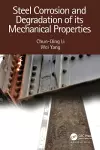
Steel Corrosion and Degradation of its Mechanical Properties
2 authors - Hardback
£115.00
Chun-Qing Li has been professor of civil engineering since 2006 initially in UK and now at RMIT, Australia. He obtained his PhD in 1994 on time-dependent reliability theory and its application to assessment of corrosion affected structures. Professor Li is the fellow of the Institution of Civil Engineers of UK (FICE) as well as the Institution of Engineers, Australia (FIEAust). He is also a chartered professional engineer of these two institutions. Professor Li has served on a number of professional bodies, and currently is Associate Editor for International Journal of Structure and Infrastructure. He was the Head of School of Civil, Environmental and Chemical Engineering in RMIT University from 2011 to 2016.
Professor Li’s core research expertise is time-dependent reliability theory and its application to service life prediction of corrosion affected structures. His research areas include risk and reliability analysis of engineering works, steel corrosion and its effects on mechanical property and structural behaviour, corrosion of buried metal pipes, mixed mode fracture failure and fracture toughness, whole life design and assessment of civil infrastructure. Professor Li’s contribution in time-dependent reliability theory is that he derived a closed-form solution to first passage probability for non-stationary Gaussian stochastic processes in 1993 and more recently (2016) he derived a new solution to first passage probability for non-stationary and non-Gaussian process. Professor Li is one of the first researchers to advance research on corrosion from material perspective to mechanical and structural perspectives since 1998; one of the first to apply first passage probability method to service life prediction of corrosion affected structures since 2004; and one of the first to propose risk-cost optimisation for developing maintenance strategy for corrosion affected structures since 2007. Professor Li’s research in risk-based service life prediction of civil infrastructure was rated "international leading" (i.e., 4* - the highest rating) in UK’s 2008 Research Assessment Exercise.
Professor Li has published over 300 papers and more than 180 papers are published in high quality international journals, e.g., ASCE journal of engineering mechanics, journal of structural engineering, ACI journals etc. He has been awarded many research grants in total over $10 m since 2000 as lead or sole CI from both national research councils of UK and Australia where he has worked.
Wei Yang is a Lecturer in Construction Management in the Faculty of Architecture, Building and Planning, The University of Melbourne. Her research expertise and interest focus on building energy efficiency, building performance evaluation, corrosion of steel and its effect on building performance, life cycle assessment and risk cost optimisation. Dr Yang’s main achievements in these areas include machine learning methods, the impact of corrosion on building service facilities, and life cycle performance of new building technologies.
Dr Yang has published over 60 papers in high impact international journals since 2010. She has received many awards for her high impact publications, including a recent CIBSE Napier Shaw Bronze medal awarded by Chartered Institution of Building Services Engineering, UK. She currently serves as Associate Editor for Frontiers in Built Environment and Frontiers in Energy Research. She is a member of The Australian and New Zealand Architectural Science Association (ANZAScA) and International Society of Indoor Air Quality and Climate (ISIAQ).
Dr Yang has successfully won 3 competitive research grants from the government and industry since 2018, including building defects in domestic buildings, solar water treatment for industry use, building energy optimization for tertiary buildings.